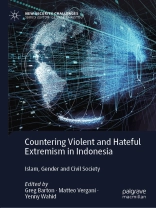This book provides an overview of preventing and countering violent extremism (P/CVE) to assist readers in developing a more complete understanding of P/CVE and the issues of radicalisation, disengagement and rehabilitation. It shines a light on some key P/CVE programmes and initiatives in Indonesia and is written to facilitate understanding preventing and countering violent extremism in a larger frame. It is intended to be of interest to civil society activists, security practitioners, communities, policy makers and researchers alike. It represents a collaboration, born out of partnership in the field, that brings together academic researchers and civil society activists from Indonesia and Australia. Around the world, far too little is known about Indonesian society in general and Indonesian Islam and civil society in particular. This is, in large measure, because of the barrier of language. This book represents a small, but hopefully significant, contribution to opening a window to Indonesia. The focus of this book is on the challenging issues entailed with violent and hateful extremism. The initiatives it portrays and the people it describes, and whose voices it channels, are filled with the hope of transforming the world to make it better.
İçerik tablosu
Chapter One: Introduction and Overview.- Chapter Two: Understanding Violent Extremism in Indonesia.- Chapter Three: Disengagement, deradicalization and rehabilitation.- Chapter Four: An Initiative of Women in Countering Violent Extremism: The Mothers for Change Program.- Chapter Five: Peace Villages: A Peacebuilding Community Initiative.- Chapter Six: International and Local Actors Collaborations to Prevent Violent Extremism among Youth in Indonesia: Initiatives and Effectiveness.- Chapter Seven: An empowerment program for spouses of convicted terrorists in Indonesia.- Chapter Eight: Gendering CVE in Indonesia: What Have We Learned So Far.- Chapter Nine: Countering Violent Extremism in Indonesia: The Role of Former Terrorists and Civil Society Organisations.- Chapter Ten: The Dynamics of Islamic Mass Organisation in Preventing Violent Extremism.- Chapter Eleven: Online Radicalisation: Overview of P/CVE Social Media Efforts in Indonesia.- Chapter Twelve: Introduction to social enterprise for practitioners in preventing and countering violent extremism.- Chapter Thirteen: Capacity gap analysis of civil society organisations, working against violent extremism in Indonesia.- Chapter Fourteen: The Way Forward.- Chapter Fifteen: Evaluation Guide: How to design impact evaluations of CVE programs: a practical guide for Indonesian civil society organizations.
Yazar hakkında
Greg Barton is a research professor in Global Islamic Politics in the Alfred Deakin Institute for Citizenship and Globalisation (ADI), Deakin University, researching Islam and civil society, democratisation and countering violent extremism. The central axis of his research interests is the way in which religious thought, individual believers and religious communities respond to modernity and to the modern nation-state.
Matteo Vergani is a researcher in ADI and a senior lecturer in sociology at Deakin University, Australia. His primary research interests are political and bias violence, its causes, its impact on society and the study of what could prevent it. he is the founder of the online platform Tackling Hate, which provides free training modules for practitioners working on tackling various forms of hate and extremism.
Yenny Wahid is the second daughter of H.E. Abdurrahman Wahid andestablished the Wahid Foundation to carry on his work in building tolerance and understanding. She was a former journalist for the Australian newspapers, The Sydney Morning Herald and The Age and a member of the special staff for political communication working in the office of President Yudhoyono.












